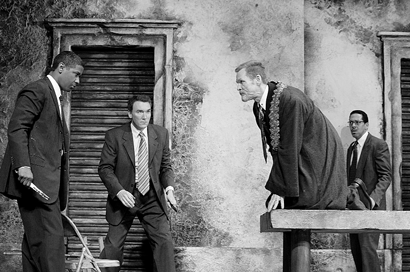Shakespeare’s “Julius Caesar” gets a contemporary makeover on Broadway
With its videogame-inspired battle staging and testosterone-imbued performances, the new production of “Julius Caesar” starring Denzel Washington is unmistakably muscular. When this new production by Daniel Sullivan succeeds, it is a searing, and timely, indictment of political corruption. The manipulation of public opinion to achieve political ends, regardless of the human costs, and the speed with which leaders establish and exploit their power, predates the Roman empire. In fact, Shakespeare’s play demonstrates that shaping public perceptions by shading the truth is as old as any system of human government. Caesar did it. Henry V did it. Churchill and FDR did it. If our current leaders do it, why should we be surprised, even if they lack the eloquence of great leadership?
That contemporary emphasis, however, is where Mr. Sullivan’s production takes a luckless detour. In the drive to be naturalistic, he clamps down on the inherent lyricism of Shakespeare’s verse. Passages, such as Cassius’ “There is a tide in the affairs of men” speech are not allowed to soar. Instead, it is almost swallowed up in the action of the play where it should be a moment for poignant reflection.
On the whole, though, Sullivan has made an often-polemical script accessible and engaging, no mean feat in a drama that gives relatively short shrift to the romantic tensions within human relationships. Sullivan has relied on riveting production values, including Ralph Funicello’s versatile and exquisitely rendered set that calls to mind the images of Iraqi street fighting. The modern dress costumes by Jess Goldstein help to drive home the parallels with today’s political structures and the movement of the actors through this environment underscores Rome’s political intrigue. In the second act, largely a battle scene, the inevitable “Miss Saigon” helicopter and bomb sounds rattled the theater.
Denzel Washington, the blockbuster film star, plays Brutus with mixed results. He has a politician’s charisma and a true believer’s passion and he plays the extremes of the conspirator’s range of emotions with flashes of electricity. Yet in the middle ground, Washington rushes and appears to lose focus, never really elucidating why Caesar must die.
Such lack of clarity undermines Eamonn Walker’s performance as Marc Antony. Walker nails the emotional high points, but his overall performance lacks subtlety. When at the end Marc Antony praises Brutus, it makes no sense, even though his final moments, when he is shut out by Octavius’ power grab, are a wonderful moment of despair and betrayal. Walker was occasionally unintelligible—not a strong point for playing a character whose power derives from his oratory skills.
The rest of the cast is good, particularly Jessica Hecht as Portia and Jack Willis in an interesting interpretation of Casca as a cynical, self-interested bureaucrat. They stand out in this production that is serviceable, thoughtful and well-constructed, if never especially electrifying.
gaycitynews.com
































